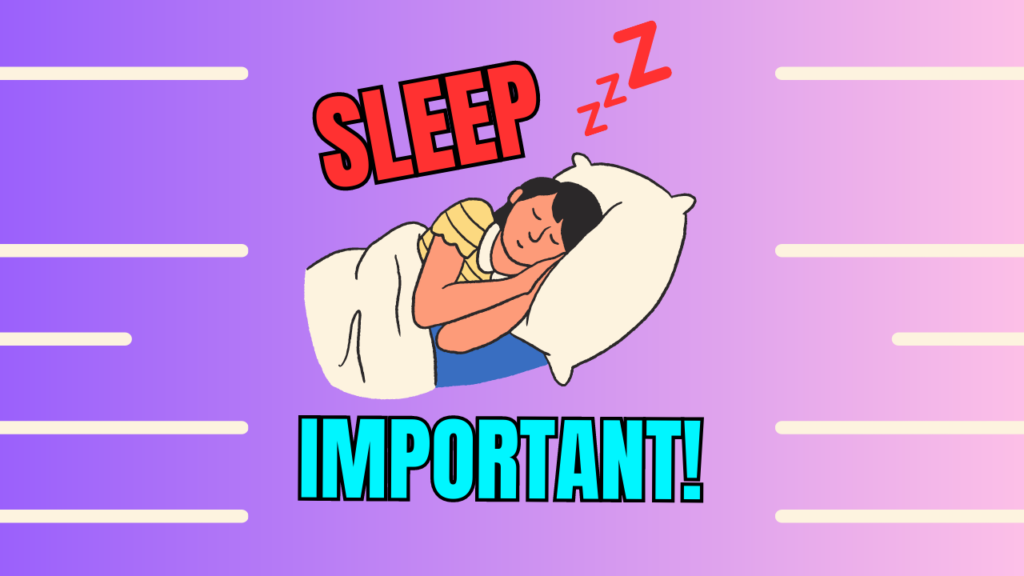
We are here to explore the essential role of sleep for weight loss results. Sleep is important for your overall well-being but it might also be the key to successful fat loss. We’ll discuss all of that in this article but also explore how you can kick-start your weight loss with healthy sleeping habits. Don’t forget to check out our guide
Why Sleep for Weight Loss Matters
We all know that when we don’t sleep we don’t feel our best. Is anyone else grumpy before their morning coffee? But you may not know that sleep plays a critical role in weight loss for several reasons.
Hormones and Sleep for Weight Loss
First, sleep plays a large part in the regulation of the hormones that control hunger, appetite, and satiety (the feeling of fullness). Ghrelin is your hunger hormone, and Leptin is your satiety hormone. Studies have shown that people who slept only 4 hours a night had higher Ghrelin levels and lower Leptin levels than people who slept 10 hours (Newsom and Truong, 2016).
When you don’t get enough sleep, your body produces more ghrelin, a hormone that stimulates hunger, and less leptin, a hormone that suppresses appetite and makes you feel full.
This can lead to overeating and weight gain.
Metabolism, Sleep, and Weight Loss
In addition to hormones, sleep also affects metabolism. When you don’t get enough sleep, your body’s metabolism slows down, making it more difficult to burn calories and lose weight. Lack of sleep can also lead to increased stress, which can trigger overeating and unhealthy food choices (Chaput and Tremblay, 2012).
Cravings, Sleep, and Weight Loss
Studies also suggest that a lack of sleep results in a change in food preferences, with the sleep-deprived tending to opt for foods high in carbohydrates and calories (Newsom and Truong, 2016). Donuts, you wiley temptress.
Lack of sleep could certainly be undoing all of your good intentions and have you running to burger and fries instead of that salad you packed for lunch, sabotaging your weight loss.
Self-Control, Sleep, and Weight Loss
Similarly, it has been shown that poor quality or reduced hours of sleep can weaken your self-control. Self-control is an essential daily skill that includes your daily decision-making around food and exercise choices. Sleep-deprived people tend to make the ‘easier choices’ which with food can mean disastrous fast food or junk food choices that will seriously limit your weight loss if chosen regularly (Pilcher, et al).
Do’s and Don’ts Sleep for Weight Loss
Do’s
- Aim for 7-9 hours of sleep per night.
- Establish a consistent sleep schedule.
- Create a relaxing sleep environment.
- Limit screen time before bedtime.
- Practice stress-reducing techniques like meditation or deep breathing.
Don’ts
- Do not sacrifice sleep.
- Avoid consuming caffeine or alcohol close to bedtime.
- Do not eat a heavy meal before bedtime.
- Avoid sleeping too much.

Tips for Improving Sleep for Weight Loss
Now that we understand the importance of sleep for weight loss, let’s explore some tips for how to improve your sleep habits for consistent weight loss results.
Establish a Sleep Routine
Establishing a consistent sleep routine can help regulate your body’s natural sleep-wake cycle and improve the quality of your sleep. Try to go to bed and wake up at the same time every day, even on weekends.
Create a Relaxing Sleep Environment
Creating a relaxing sleep environment can help you fall asleep faster and sleep more deeply. Make sure your bedroom is cool, quiet, and dark, and consider using white noise or earplugs to block out any distractions.
Ear Plugs for Noise Reduction
Limit Screen Time Before Bed
The blue light emitted by electronic devices like phones and computers can interfere with your body’s natural sleep-wake cycle.
Try to avoid using electronic devices for at least an hour before bed, and consider using a blue light filter on your devices if you must use them.
Avoid Caffeine and Alcohol Before Bed
Caffeine and alcohol can disrupt sleep and affect the quality of your sleep. Avoid consuming caffeine and alcohol for at least a few hours before bed.
Traditional Medicinals Organic Nighty Night Tea
Valerian Relaxation Tea
Herbal Sleep Supplement with Valerian Root, Lavender & Chamomile
- USDA Organic product
- Minty and sweet with notes of citrus and spice
- Promotes a good night’s sleep
- Caffeine Free
Exercise Regularly
Regular exercise can help improve the quality of your sleep and promote weight loss. Aim for at least 30 minutes of moderate-intensity aerobic exercise per day, and avoid exercising too close to bedtime, as it can interfere with sleep.
Manage Stress
Stress can interfere with sleep and trigger overeating and unhealthy food choices. Practice stress management techniques like meditation, deep breathing, or yoga to help reduce stress and improve sleep.
FAQ: Sleep for Weight Loss
Is sleep important for weight loss?
How does sleep affect weight loss?
How many hours of sleep should I aim for to support weight loss?
Can poor sleep quality hinder weight loss progress?
Are there any tips for improving sleep quality for weight loss?
Can napping during the day affect weight loss?
Can sleep alone lead to weight loss?
Can stress impact sleep and weight loss?
Conclusion Sleep for Weight Loss💭
Getting enough sleep is an important component of weight loss and overall health.
Lack of sleep can lead to overeating, slower metabolism, and increased stress, all of which can hinder weight loss progress.
By establishing a sleep routine, creating a relaxing sleep environment, limiting screen time before bed, avoiding caffeine and alcohol, exercising regularly, and managing stress, you can improve your sleep habits and achieve consistent weight loss results.
References
Newson, M. and Truong, K. 2016 Weight Loss and Sleep. Available at: https://www.sleepfoundation.org/physical-health/weight-loss-and-sleep
Pilcher, J. J., Morris, D. M., Donnelly, J., & Feigl, H. B. (2015). Interactions between sleep habits and self-control. Frontiers in human neuroscience, 9, 284. Available at: https://www.ncbi.nlm.nih.gov/pmc/articles/PMC4426706/
Chaput, J. P., & Tremblay, A. (2012). Adequate sleep to improve the treatment of obesity. CMAJ : Canadian Medical Association journal = journal de l’Association medicale canadienne, 184(18), 1975–1976. Available at: https://www.ncbi.nlm.nih.gov/pmc/articles/PMC3519150/






Leave a Reply